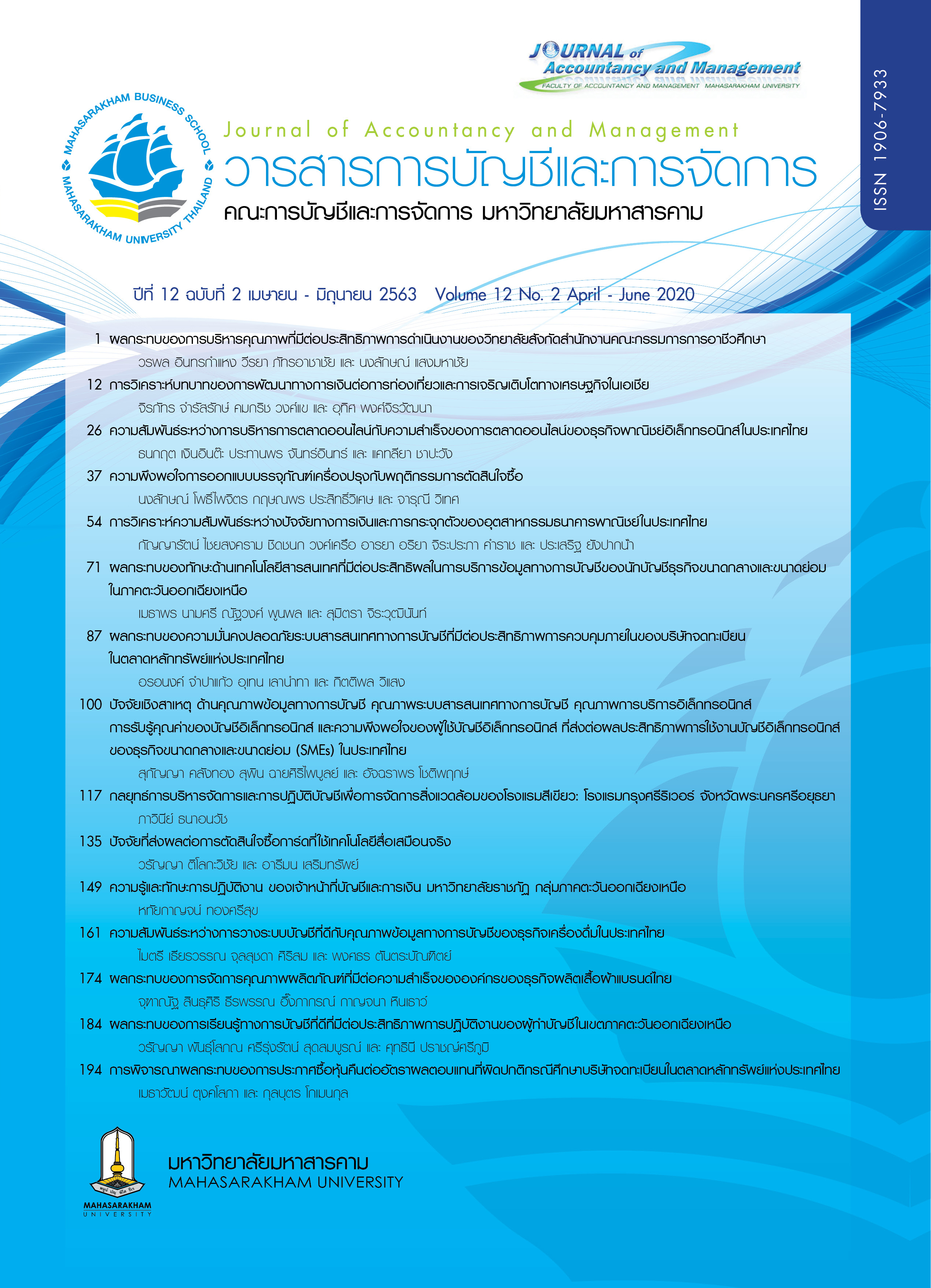กลยุทธ์การบริหารจัดการและการปฏิบัติบัญชีเพื่อการจัดการสิ่งแวดล้อม ของโรงแรมสีเขียว: โรงแรมกรุงศรีริเวอร์ จังหวัดพระนครศรีอยุธยา
Main Article Content
บทคัดย่อ
งานวิจัยนี้มีวัตถุประสงค์ 1)เพื่อศึกษาปัจจัยที่มีอิทธิพลต่อการตัดสินใจเลือกใช้บริการโรงแรมกรุงศรี- ริเวอร์ 2)เพื่อศึกษาการปฏิบัติเกี่ยวกับการบัญชีเพื่อการจัดการสิ่งแวดล้อม 3)เพื่อพัฒนากลยุทธ์ในการบริหารจัดการธุรกิจโรงแรมสีเขียว รูปแบบการวิจัยเป็นแบบผสานวิธี พื้นที่วิจัย คือโรงแรมกรุงศรีริเวอร์ จังหวัดพระนครศรีอยุธยา กลุ่มเป้าหมายแบ่งออกเป็น 2 กลุ่ม ได้แก่ 1)ผู้เข้าพัก จำนวน 56 คน ใช้วิธีคัดเลือกแบบบังเอิญ 2)บุคลากรของโรงแรม จำนวน 8 คน ใช้วิธีคัดเลือกแบบเจาะจง เครื่องมือที่ใช้ในการวิจัย มี 2 ชนิด คือ 1)แบบสอบถาม 2)แบบสัมภาษณ์แบบมีโครงสร้าง ข้อมูลเชิงปริมาณวิเคราะห์โดยใช้สถิติพื้นฐาน คือ ร้อยละ ค่าเฉลี่ย และส่วนเบี่ยงเบนมาตรฐาน ส่วนข้อมูลเชิงคุณภาพใช้การวิเคราะห์เนื้อหาแล้วเขียนบรรยายเชิงพรรณนา ผลการวิจัยพบว่า 1)ปัจจัยที่มีอิทธิพลต่อการตัดสินใจเลือกใช้บริการโรงแรมกรุงศรีริเวอร์ในรูปแบบโรงแรมที่เป็นมิตรต่อสิ่งแวดล้อมมีค่าเฉลี่ยมากที่สุดคือด้านทำเลที่ตั้ง เป็นโรงแรมที่อยู่ใจกลางเมืองและสะดวกต่อการเดินทาง 2)การจัดทำบัญชีเพื่อการจัดการสิ่งแวดล้อม ทำให้โรงแรมกรุงศรีริเวอร์เกิดความคุ้มค่าในด้านการลงทุนทางการเงิน ทำให้โรงแรมเพิ่มความสามารถในการสร้างผลกำไร และทำให้เกิดมูลค่าทางการเงินขององค์กรและภาพลักษณ์ของโรงแรมในสายตาของลูกค้าดีขึ้น 3)กลยุทธ์การบริหารจัดการโรงแรมสีเขียวของโรงแรมกรุงศรีริเวอร์ มีกลยุทธ์ด้านการจัดการสิ่งแวดล้อมอย่างชัดเจน มีแผนงาน/โครงการมีการกันงบประมาณในการปรับปรุงการจัดการสิ่งแวดล้อม และมีการติดตามประเมินผลการดำเนินงานด้านสิ่งแวดล้อมอย่างสม่ำเสมอ
Downloads
Article Details
บทความที่ได้รับการตีพิมพ์เป็นลิขสิทธิ์ของวารสารการบัญชีและการจัดการ
ข้อความที่ปรากฏในบทความแต่ละเรื่องในวารสารวิชาการเล่มนี้เป็นความคิดเห็นส่วนตัวของผู้เขียนแต่ละท่านไม่เกี่ยวข้องกับมหาวิทยาลัยมหาสารคาม และคณาจารย์ท่านอื่นๆในมหาวิทยาลัยฯ แต่อย่างใด ความรับผิดชอบองค์ประกอบทั้งหมดของบทความแต่ละเรื่องเป็นของผู้เขียนแต่ละท่าน หากมีความผิดพลาดใดๆ ผู้เขียนแต่ละท่านจะรับผิดชอบบทความของตนเองแต่ผู้เดียว
เอกสารอ้างอิง
กรมส่งเสริมคุณภาพสิ่งแวดล้อม. (2558). โรงแรมที่เป็นมิตรกับสิ่งแวดล้อม (Green Hotel). ค้นเมื่อ 8 มิถุนายน 2562. จาก http://www.deqp.go.th/service-portal/g-green/greenhotel/derivation/
ฉัตยาพร เสมอใจ. (2550). พฤติกรรมผู้บริโภค. กรุงเทพฯ : เอ็กซเปอร์เน็ท.
พระราชบัญญัติโรงแรม พ.ศ. 2547 มาตราที่ 34. (2547). ค้นเมื่อ 12 มกราคม 2562. จาก http://www.bsa.or.th/กฎหมาย/พระราชบัญญัติ-โรงแรม-พศ-๒๕๔๗.
ฐิติกานต์ สุริยะสาร. (2559). ผลกระทบของการประยุกต์ใช้ข้อมูลการบัญชีบริหารที่มีต่อความสำเร็จในการดำเนินงานของธุรกิจโรงแรมในประเทศไทย. วารสารการบัญชีและการจัดการ มหาวิทยาลัยมหาสารคาม. 8(2), 127-140
ดวงมณี โกมารทัต. (2554). การบริหารต้นทุน. พิมพ์ครั้งที่ 3. กรุงเทพฯ : สำนักพิมพ์แห่งจุฬาลงกรณ์มหาวิทยาลัย.
นิรมล กิติกุล. (2552). วิธีวิจัยทางธุรกิจ. กรุงเทพฯ : เพชรเกษมพริ้นติ้งกรุ๊ป.
ปพฤกษ์บารมี อุตสาหะวาณิชกิจ. (2560). การบัญชีเพื่อการจัดการสิ่งแวดล้อม ภาพลักษณ์องค์กร การมีส่วนร่วมของผู้มีส่วนได้เสียความอยู่รอดของกิจการและความยั่งยืนขององค์กร. วารสารวิทยาการจัดการ. 34(1), 27-56
พยอม กบิลพัฒน์, ศรีรุ่งรัตน์ สุดสมบูรณ์ และศุทธินี ปราชญ์ศรีภูมิ. (2556). ผลกระทบของความรับผิดชอบทางสังคมเชิงกลยุทธ์และการเปิดเผยข้อมูลด้านสิ่งแวดล้อมที่มีต่อประสิทธิผลการบัญชีสิ่งแวดล้อมของธุรกิจที่ได้รับมาตรฐาน ISO 14001 ในประเทศไทย. วารสารการบัญชีและการจัดการ มหาวิทยาลัยมหาสารคาม, 5 (3), 217-229
พรรณิภา ซาวคำ. (2559). กลยุทธ์การบริหารจัดการภายในโรงแรม : กรณีศึกษาโรงแรมขนาดเล็กในเขตอำเภอเมืองจังหวัดเชียงราย. วารวิทยาลัยดุสิตธานี, 10(1), 93
สัตยา ตันจันทร์พงษ์, พัทธ์ยศ เดชศิริ และทัดพงษ์ อวิโรธนานนท์. (2561). อิทธิพลของการเปิดเผยข้อมูลรายงานการพัฒนาความยั่งยืนที่มีต่อมูลค่ากิจการ. วารสารการบัญชีและการจัดการ มหาวิทยาลัยมหาสารคาม, 11(1), 131-144
Borzuzadeh, M. (2011). Operational Budgeting. Tehran : Sepinu Publications. Cantor et al. (2013). Examining the role of Stakeholder pressure and knowledge management on supply chain risk and demand responsiveness. The International Journal of Logistics Management, 25(1), 202-223.
Bracci, E. & Maran, L. (2013). Environmental management and regulation: pitfalls of environmental accounting. Management of Environmental Quality, 24(4), 538-554.
Gray, R., Bebbington J., & Walters, D. (1993). Accounting and the Environment (Greening of Accountancy II) (Paul Chapman Publishing: London). This book was translated into South American Spanish.
Gray, R. & Perks,O. D., & Maunders, k. (1987). Corporate Social Reporting : Accounting and Accountability, Prentice Hall, London.
Hamid, R. N., & Salehe, M. (2015). Environmental Costs and Environmental Information Disclosure in the Accounting Systems. International Journal of Academic Research in Accounting, Finance and Management Sciences, 5(1), 13–18.
Hasan, S., & Hakan, O. (2012). The Importance of Environmental Accounting in the Context of Sustainable Development and Within IFRS Evaluation. 3rd International Symposium on Sustainable Development.
Kelley, S. (2009). GM 105 Strategy Management. Introduction to strategy. Retrieved March 30, 2019, from www.Csus.edu/indiv/k/kelleyca/mgmt 129/.../Strategy Management.ppt
Khalid, F. M., Lord, B. R., & Dixon, K. (2012). Environmental management accounting implementation in environmentally sensitive industries in Malaysia. Paper presented at the 6th NZ Management Accounting Conference, Palmerston North, 22-23 Nov 2012.
Krishna, M., & Peter, Y. (2013). Green Accounting: Cost Measures. Open Journal of Accounting, 2013, 2 : 4-7
Kotler, P., & Armstrong, G. (2001). Principles of marketing. (9th ed.). New Jersey: Prentice-Hall.
Mintzberg, H. (1994). The Rise and Fall of Strategic Planning. New York: Prentice-Hall.
Neungruthai. (2013). Towards a Conceptual Model for Sustainability Financial Reporting System, Accounting and Finance Association of Australia and New Zealand (AFAANZ) Conference, 7-9 July,2013, Perth Australia.
Oppenheim, I. (1979). Management of the modern home. (2 nd ed.). NewYork: Macmillan Publishing.
Parnasis, M. (1998). Environmental Management in Thai Hotel Industry, Canadian University Consortium, AsianInstitute of Technology, Urban Environmental Management, Private Sector Initiative. Retrieved May 31, 2015, fromhttp://www.ucalgary. ca/ev/designresearch/projects/2000/cuc/tp/outreach
Ramanathan, k. V. (1976). Toward a theory of corporate social accounting, Accounting Review, 51
Robinot, E., & Giannelloni, J. L. (2010). Do hotels’ “green” attributes contribute to customer satisfaction? Journal of Services Marketing, 24(2), 157-169.
Somnath, S.K., Bose R.S. Dhalla. (2011). Environmental Management Accounting : An Overview of its Methodological Development. IJBIT. 5(1)
Watchaneeporn. (2010) Barriers to the development of environmental management accounting, EuroMed Journal of Business, Emerald Group Publishing Limited , 5(3), 1450-2194.
Wood, D. J., & Jeanne, M. L. (2001). Theorising Business Citizenship. In Andriof and Mclntosh, 83-103.


